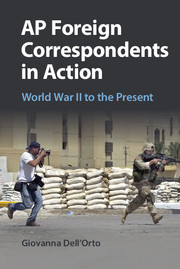Book contents
- Frontmatter
- Dedication
- Contents
- List of Figures
- Acknowledgments
- 1 Introduction
- 2 Getting Ready, Getting Started, and Getting Lost in Translation
- 3 What's the Story? News Judgment, News Pitches
- 4 Getting to the Sources (and Keeping Them Alive)
- 5 Being an American Abroad – Perceptions of Journalists
- 6 Eyewitness Reporting: Getting to the Scene
- 7 The Costs of Being There to Count the Bodies
- 8 Your Byline Today, Mine Tomorrow: Teamwork and Competition
- 9 Access, Censorship, and Spin: Relating with Foreign Governments
- 10 Flacks, Spooks, GIs, and Objective Journalists: Relating with the U.S. Government Abroad
- 11 Getting It Out, Getting It Edited: Filing News, Working with the Desk
- 12 The Evolving Milkmen: Writing for an Audience
- 13 Purpose and Influence of Foreign Correspondence
- 14 Eight Decades of Bearing Witness and Telling the World's Stories: Conclusions
- Bibliography
- Index
5 - Being an American Abroad – Perceptions of Journalists
Published online by Cambridge University Press: 05 November 2015
- Frontmatter
- Dedication
- Contents
- List of Figures
- Acknowledgments
- 1 Introduction
- 2 Getting Ready, Getting Started, and Getting Lost in Translation
- 3 What's the Story? News Judgment, News Pitches
- 4 Getting to the Sources (and Keeping Them Alive)
- 5 Being an American Abroad – Perceptions of Journalists
- 6 Eyewitness Reporting: Getting to the Scene
- 7 The Costs of Being There to Count the Bodies
- 8 Your Byline Today, Mine Tomorrow: Teamwork and Competition
- 9 Access, Censorship, and Spin: Relating with Foreign Governments
- 10 Flacks, Spooks, GIs, and Objective Journalists: Relating with the U.S. Government Abroad
- 11 Getting It Out, Getting It Edited: Filing News, Working with the Desk
- 12 The Evolving Milkmen: Writing for an Audience
- 13 Purpose and Influence of Foreign Correspondence
- 14 Eight Decades of Bearing Witness and Telling the World's Stories: Conclusions
- Bibliography
- Index
Summary
The thing about the [early 1980s] Lebanon war was you could go anywhere as a correspondent, even an American correspondent. You could show up and virtually every side would talk to you and respect your credentials – not the government credentials. The AP had very elaborate credentials made to look impressive in Arabic and English. … We used to carry during the war at least a half a dozen press passes. You had one for the government, you had one for the major militias, each of them, you had one for the major PLO factions, you had a Syrian … And then it started going all bad and … those people … were not interested in anything about who you were, other than that you were an American, the Westerner, etc. … There were very few correspondents left when I was kidnapped. … And I told [colleagues and relatives] they are not going to take me because right now … I'm telling their story, I was covering the Israeli occupation of South Lebanon, struggling down to South Lebanon, doing stories about what the Israelis were doing, which was cutting down 500-year-old olive groves and … generally rampaging through South Lebanon. … [I was] one of the few people who was covering the occupation of South Lebanon, but as it turned out they didn't care, it didn't matter. In fact, they thought I was a spy, so I was doubly on their list. (Anderson, 17–18)
Terry Anderson, an American AP correspondent, was kidnapped by Hezbollah militants in Beirut in March 1985 and held hostage – virtually always in tiny windowless rooms, chained hand and foot to walls – for almost seven years, longer than all other foreign hostages held periodically with him (see this chapter's box). Quietly recalling the ordeal nearly 30 years later in his plant-ringed south Florida rambler, Anderson (25) figured that his persona as a well-known U.S. journalist made him into the kidnappers’ “poster boy,” keeping him (and them) in the news, but might also have saved his life, because killing him “was going to look bad.” Albeit usually far less tragically, all foreign correspondents’ practices, especially their ability to get access to both sources and scenes, are affected by who they are, beginning with foreigners and journalists – and as in Anderson's case, which of those identifiers comes first could mean life or death.
- Type
- Chapter
- Information
- AP Foreign Correspondents in ActionWorld War II to the Present, pp. 125 - 146Publisher: Cambridge University PressPrint publication year: 2015



